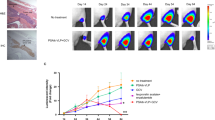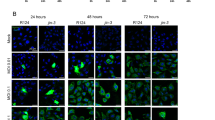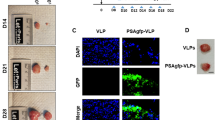Abstract
The use of conditionally replicating adenoviruses offers an attractive complementary treatment strategy for localized prostate cancer. We have produced a replicating adenovirus, Ad[I/PPT-E1A], where E1A gene expression is controlled by a recombinant regulatory sequence designated PPT. The PPT sequence comprises a PSA enhancer, a PSMA enhancer and a T-cell receptor γ-chain alternate reading frame protein promoter, and it is shielded from transcriptional interference from adenoviral backbone sequences by an H19 insulator. Ad[I/PPT-E1A] yields prostate-specific E1A protein expression, viral replication and cytolysis in vitro. Furthermore, Ad[I/PPT-E1A] considerably regresses the growth of subcutaneous LNCaP prostate cancer tumors in nude mice. Importantly, the viral replication and cytolytic effect of Ad[I/PPT-E1A] are independent of the testosterone levels in the prostate cancer cells. This may be beneficial in a clinical setting since many prostate cancer patients are treated with androgen withdrawal. In conclusion, Ad[I/PPT-E1A] may prove to be useful in the treatment of localized prostate cancer.
This is a preview of subscription content, access via your institution
Access options
Subscribe to this journal
Receive 12 print issues and online access
$259.00 per year
only $21.58 per issue
Buy this article
- Purchase on Springer Link
- Instant access to full article PDF
Prices may be subject to local taxes which are calculated during checkout






Similar content being viewed by others
References
Foley R, Lawler M, Hollywood D . Gene-based therapy in prostate cancer. Lancet Oncol 2004; 5: 469–479.
Jemal A, Tiwari RC, Murray T, Ghafoor A, Samuels A, Ward E et al. Cancer statistics, 2004. CA Cancer J Clin 2004; 54: 8–29.
Jani AB, Hellman S . Early prostate cancer: clinical decision-making. Lancet 2003; 361: 1045–1053.
Scattoni V, Montorsi F, Picchio M, Roscigno M, Salonia A, Rtgatti P et al. Diagnosis of local recurrence after radical prostatectomy. BJU Int 2004; 93: 680–688.
Alemany R, Balague C, Curiel DT . Replicative adenoviruses for cancer therapy. Nat Biotechnol 2000; 18: 723–727.
Bischoff JR, Kirn DH, Williams A, Heise C, Horn S, Muna M et al. An adenovirus mutant that replicates selectively in p53-deficient human tumor cells. Science 1996; 274: 373–376.
Rothmann T, Hengstermann A, Whitaker NJ, Scheffner M, zur Hausen H . Replication of ONYX-015, a potential anticancer adenovirus, is independent of p53 status in tumor cells. J Virol 1998; 72: 9470–9478.
Ries SJ, Brandts CH, Chung AS, Biederer CH, Hann BC, Lipner EM et al. Loss of p14ARF in tumor cells facilitates replication of the adenovirus mutant dl1520 (ONYX-015). Nat Med 2000; 6: 1128–1133.
Nemunaitis J, Cunningham C, Buchanan A, Blackburn A, Edelman G, Maples P et al. Intravenous infusion of a replication-selective adenovirus (ONYX-015) in cancer patients: safety, feasibility and biological activity. Gene Therapy 2001; 8: 746–759.
Nemunaitis J, Ganly I, Khuri F, Arseneau J, Kuhn J, McCarty T et al. Selective replication and oncolysis in p53 mutant tumors with ONYX-015, an E1B-55kD gene-deleted adenovirus, in patients with advanced head and neck cancer: a phase II trial. Cancer Res 2000; 60: 6359–6366.
Freytag SO, Khil M, Stricker H, Peabody J, Menon M, DePeralta-Venturina M et al. Phase I study of replication-competent adenovirus-mediated double suicide gene therapy for the treatment of locally recurrent prostate cancer. Cancer Res 2002; 62: 4968–4976.
Freytag SO, Stricker H, Pegg J, Paielli D, Pradhan DG, Peabody J et al. Phase I study of replication-competent adenovirus-mediated double-suicide gene therapy in combination with conventional-dose three-dimensional conformal radiation therapy for the treatment of newly diagnosed, intermediate- to high-risk prostate cancer. Cancer Res 2003; 63: 7497–7506.
Fueyo J, Gomez-Manzano C, Alemany R, Lee PS, McDonnell TJ, Mitlianga P et al. A mutant oncolytic adenovirus targeting the Rb pathway produces anti-glioma effect in vivo. Oncogene 2000; 19: 2–12.
Huang TG, Savontaus MJ, Shinozaki K, Sauter BV, Woo SL . Telomerase-dependent oncolytic adenovirus for cancer treatment. Gene Therapy 2003; 10: 1241–1247.
Shirakawa T, Hamada K, Zhang Z, Okada H, Tagawa M, Kamidono S et al. A cox-2 promoter-based replication-selective adenoviral vector to target the cox-2-expressing human bladder cancer cells. Clin Cancer Res 2004; 10: 4342–4348.
Maemondo M, Saijo Y, Narumi K, Kikuchi T, Usui K, Tazawa R et al. Gene therapy with secretory leukoprotease inhibitor promoter-controlled replication-competent adenovirus for non-small cell lung cancer. Cancer Res 2004; 64: 4611–4620.
Hallenbeck PL, Chang YN, Hay C, Golightly D, Stewart D, Lin J et al. A novel tumor-specific replication-restricted adenoviral vector for gene therapy of hepatocellular carcinoma. Hum Gene Ther 1999; 10: 1721–1733.
Yu DC, Sakamoto GT, Henderson DR . Identification of the transcriptional regulatory sequences of human kallikrein 2 and their use in the construction of calydon virus 764, an attenuated replication competent adenovirus for prostate cancer therapy. Cancer Res 1999; 59: 1498–1504.
DeWeese TL, van der Poel H, Li S, Mikhak B, Drew R, Goemann M et al. A phase I trial of CV706, a replication-competent, PSA selective oncolytic adenovirus, for the treatment of locally recurrent prostate cancer following radiation therapy. Cancer Res 2001; 61: 7464–7472.
Cheng WS, Giandomenico V, Pastan I, Essand M . Characterization of the androgen-regulated prostate-specific T cell receptor gamma-chain alternate reading frame protein (TARP) promoter. Endocrinology 2003; 144: 3433–3440.
Cheng WS, Kraaij R, Nilsson B, Van Der Weel L, De Ridder CM, Totterman TH et al. A novel TARP-promoter-based adenovirus against hormone-dependent and hormone-refractory prostate cancer. Mol Ther 2004; 10: 355–364.
He TC, Zhou S, da Costa LT, Yu J, Kinzler KW, Vogelstein B . A simplified system for generating recombinant adenoviruses. Proc Natl Acad Sci USA 1998; 95: 2509–2514.
Kanduri C, Holmgren C, Pilartz M, Franklin G, Kanduri M, Liu L et al. The 5′ flank of mouse H19 in an unusual chromatin conformation unidirectionally blocks enhancer-promoter communication. Curr Biol 2000; 10: 449–457.
Yu W, Ginjala V, Pant V, Chemukhin I, Whitehead J, Docquier F et al. Poly(ADP-ribosyl)ation regulates CTCF-dependent chromatin insulation. Nat Genet 2004; 36: 1105–1110.
Nettelbeck DM, Rivera AA, Balague C, Alemany R, Curiel DT . Novel oncolytic adenoviruses targeted to melanoma: specific viral replication and cytolysis by expression of E1A mutants from the tyrosinase enhancer/promoter. Cancer Res 2002; 62: 4663–4670.
Peter I, Graf C, Dummer R, Schaffner W, Greber UF, Hemmi S . A novel attenuated replication-competent adenovirus for melanoma therapy. Gene Therapy 2003; 10: 530–539.
Rodriguez R, Schuur ER, Lim HY, Henderson GA, Simons JW, Henderson DR . Prostate attenuated replication competent adenovirus (ARCA) CN706: a selective cytotoxic for prostate-specific antigen-positive prostate cancer cells. Cancer Res 1997; 57: 2559–2563.
Yu DC, Chen Y, Seng M, Dilley J, Henderson DR . The addition of adenovirus type 5 region E3 enables calydon virus 787 to eliminate distant prostate tumor xenografts. Cancer Res 1999; 59: 4200–4203.
Lee SJ, Zhang Y, Lee SD, Jung C, Li X, Kim HS et al. Targeting prostate cancer with conditionally replicative adenovirus using PSMA enhancer. Mol Ther 2004; 10: 1051–1058.
Khuri FR, Nemunaitis J, Ganly I, Arseneau J, Tannock IF, Romel L et al. A controlled trial of intratumoral ONYX-015, a selectively-replicating adenovirus, in combination with cisplatin and 5-fluorouracil in patients with recurrent head and neck cancer. Nat Med 2000; 6: 879–885.
Nanda D, Vogels R, Havenga M, Avezaat CJ, Bout A, Smitt PS . Treatment of malignant gliomas with a replicating adenoviral vector expressing herpes simplex virus-thymidine kinase. Cancer Res 2001; 61: 8743–8750.
Sova P, Ren XW, Ni S, Bernt KM, Mi J, Kiviat N et al. A tumor-targeted and conditionally replicating oncolytic adenovirus vector expressing TRAIL for treatment of liver metastases. Mol Ther 2004; 9: 496–509.
Zhang Q, Nie M, Sham J, Su C, Xue H, Chua D et al. Effective gene-viral therapy for telomerase-positive cancers by selective replicative-competent adenovirus combining with endostatin gene. Cancer Res 2004; 64: 5390–5397.
Doronin K, Toth K, Kuppuswamy M, Krajcsi P, Tollefson AE, Wold WS . Overexpression of the ADP (E3-11.6K) protein increases cell lysis and spread of adenovirus. Virology 2003; 305: 378–387.
Lee CT, Park KH, Yanagisawa K, Adachi Y, Ohm JE, Nadaf S et al. Combination therapy with conditionally replicating adenovirus and replication defective adenovirus. Cancer Res 2004; 64: 6660–6665.
Acknowledgements
We thank Dr Valeria Giandomenico for technical advices and fruitful discussions. This work was supported by the Swedish Cancer Society (Grant 4419-B03-04XBB) and the European Community on behalf of the Prostate Cancer: Initiative for Gene Therapy group (Grant QLK6-CT-2000-00271).
Author information
Authors and Affiliations
Corresponding author
Rights and permissions
About this article
Cite this article
Cheng, WS., Dzojic, H., Nilsson, B. et al. An oncolytic conditionally replicating adenovirus for hormone-dependent and hormone-independent prostate cancer. Cancer Gene Ther 13, 13–20 (2006). https://doi.org/10.1038/sj.cgt.7700881
Received:
Accepted:
Published:
Issue Date:
DOI: https://doi.org/10.1038/sj.cgt.7700881
Keywords
This article is cited by
-
Adenoviral vectors for cardiovascular gene therapy applications: a clinical and industry perspective
Journal of Molecular Medicine (2022)
-
TARP as antigen in cancer immunotherapy
Cancer Immunology, Immunotherapy (2021)
-
Dendritic cells serve as a “Trojan horse” for oncolytic adenovirus delivery in the treatment of mouse prostate cancer
Acta Pharmacologica Sinica (2016)
-
Antitumor effects of oncolytic adenovirus armed with PSA-IZ-CD40L fusion gene against prostate cancer
Gene Therapy (2014)
-
Increased therapeutic efficacy of the prostate-specific oncolytic adenovirus Ad[I/PPT-E1A] by reduction of the insulator size and introduction of the full-length E3 region
Cancer Gene Therapy (2008)



